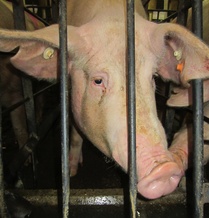 According to Science Daily, new research conducted by the University of Guelph’s Department of Animal and Poultry Science shows that animals in captivity exhibit boredom and seek stimulation. Researchers studied two sets of captive mink – one that was housed in small, barren cages and the other that was kept in “enriched” cages, where the animals had access to water for wading, tunnels, and objects to play with.
According to Science Daily, new research conducted by the University of Guelph’s Department of Animal and Poultry Science shows that animals in captivity exhibit boredom and seek stimulation. Researchers studied two sets of captive mink – one that was housed in small, barren cages and the other that was kept in “enriched” cages, where the animals had access to water for wading, tunnels, and objects to play with.
The scientists found that mink in non-enriched cages “avidly seek stimulation,” exhibiting clear signs of boredom. Researchers also recorded “lower levels of physiological stress” among the mink in enriched cages. “Being able to now study boredom in non-human animals is an important step in our efforts to understand its causes and effects and find ways to alleviate boredom-related problems across species,” said Guelph neuroscientist and psychology professor Mark Fenske.
On factory farms, millions of animals are barred from any stimulation or natural group interaction. Pregnant pigs spend nearly their entire miserable lives confined to metal gestation crates, unable to turn around, lie down, or engage in any natural behaviors. Many of these highly intelligent animals are driven mad by such denial of physical and mental stimulation. Turkeys and chickens raised for meat and eggs are kept in overcrowded, filthy, ammonia-filled sheds with no access to sunlight for their entire lives, deprived of roosting in trees, making nests, or foraging for food as they would in nature.
Thankfully, we can take a stand against animal abuse by switching to a compassionate vegan lifestyle. Visit ChooseVeg.com for hundreds of recipes and tips on making the transition.